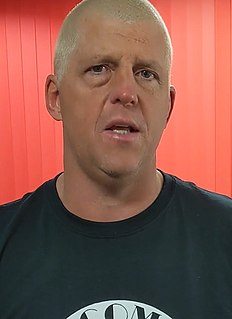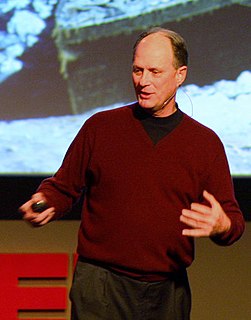A Quote by Max Lucado
I think there is a time, if I can say this; there is a time in a message where you might just tell a story to give your audience a break.
Related Quotes
I've found great virtue in two-thirds of the way into the message; right before I'm really want to nail home a point, pausing to tell a joke or to tell a light-hearted story, because I know my audience has been working with me now for 20 or 25 minutes. And if I can get them to laugh, get oxygen into their system, it wakes up those who might be sleeping, so there's something about using a story to draw people back in right before you drive home your final point. In that case I think it's real legitimate just to use a story for story's sake.
My name is growing all the time, and I’ve lived a very long, long time; so my name is like a story. Real names tell you the story of the things they belong to in my language, in the Old Entish as you might say. It is a lovely language, but it takes a very long time to say anything in it, because we do not say anything in it, unless it is worth taking a long time to say, and to listen to.
*I want to keep walking away from the person I was a moment ago... *So soon you will be in that part of the book where you are holding the bulk of the pages in your left hand, and only a thin wisp of the story in your right. *We get one story, you and I, and one story alone....It might be time for you to go. It might be time to change, to shine out.
As a filmmaker, I wish we didn't have to do trailers at all, quite honestly. I wish we didn't have to do posters. I wish didn't have to give anything away. I wish people could just come in the movie blind. But as an audience member, I respect that you have to tell an audience that this is worth your time.
If you have to tell a story without speaking, it's sort of like - I come from a dance background, so it's like a ballet where you have to tell a story with just your body. I think that's really interesting to have to tell a story with just your face and your mannerisms, and I'd like to tap into that world.
Speakers find joy in public speaking when they realize that a speech is all about the audience, not the speaker. Most speakers are so caught up in their own concerns and so driven to cover certain points or get a certain message across that they can't be bothered to think in more than a perfunctory way about the audience. And the irony is, of course, that there is no hope of getting your message across if that's all the energy you put into the audience. So let go, and give the moment to the audience.
The audience does not need to tune themselves to you - you need to tune your message to fit them. Skilled presenting requires you to understand their hearts and minds and create a message to resonate with what's already there. Your audience will be significantly moved if you send a message that is tuned to their needs and desires. They might even quiver with enthusiasm and act in concert to create beautiful results.
Most of the time you are growing up, people tell you what's wrong with you. Your coach tells you, your parents tell you, the teachers tell you when they grade you. I think that's very good in the early stages, because it helps you then develop skills. But at some point in your career, generally I think when you are in your teens, you look in a mirror and you have to say, despite all the bumps and warts, "I like that person I'm looking at, and let's just do our best."
The best time to tell your story is when you have to tell your story. When it's not really a choice. But then, when you get that first, messy, complicated version down, you have to read it over and be very tough on yourself and ask, 'Well what's the story here?' If you're lucky enough to have someone you trust looking over your shoulder, he or she can help you if [you] lack perspective on your own story.
There was a time before I felt I was a real writer, when I was a yarn spinner and I just wanted to tell story until it was over. But then there came a time where I was like, 'No, I want to understand something through writing this that I might have not understood before. I want people to come away with something to think about.'
Because everybody lies. It's part of living in society. Don't get me wrong-I think it's necessary. The last thing anyone wants is to live in a society where total honesty prevails. Can you imagine the conversations? You're short and fat, one person might say, and the other might answer, I know. But you smell bad. It just wouldn't work. So people lie by omission all the time. People will tell you most of the story...and I've learned that the part they neglect to tell you is often the most important part. People hide the truth because they're afraid." -Jo





































